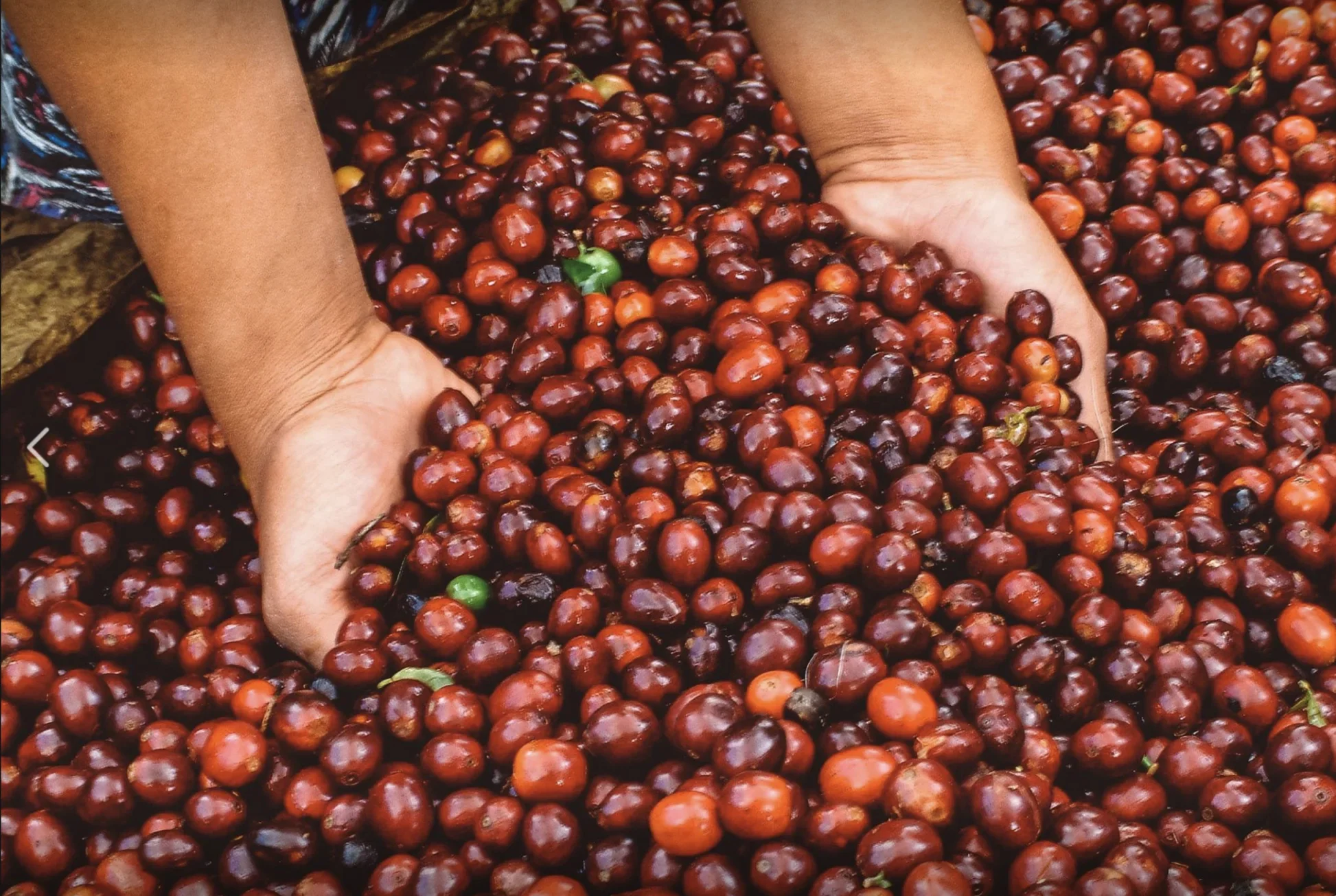
AN ORIGIN STORY
Thousands of jewel colored fruits lay in mounds on the ground, among the emerald peaks of one of El Salvador’s largest volcanoes. The fruit is piled on tarps as workers pick quickly through the heaps of rich red and deep purple, looking for glimmers of green- signs the fruit is undeveloped, unready for the next step. Hours of labor and years of love have gone into this moment. The work brewing in the wilds of Central America is the beginning of a process that will end in the perfect cup of Dutch Bros Coffee.
The seeds of the fruit will ultimately end up at a roasting facility 3,600 miles away, in Grants Pass, Oregon, where Dutch Bros Coffee started in 1992. The company was created by brothers Dane and Travis Boersma after the family was forced to shut down its dairy business.
“I sat down with my brother and we talked about what we should do next. Dane had owned a Dairy Queen franchise in his 20s and I was intrigued by the coffee trend starting in the Pacific Northwest,” said Travis Boersma, the co-founder of what is now the nation’s largest privately held drive-thru coffee company. “We drove through the northwest experiencing the coffee world and decided we wanted to give our own brew a shot. We started with 100 pounds of beans and a double head espresso machine.”
The first stand opened in a pop-up tent set up beside railroad tracks in downtown Grants Pass. Over the last 26 years, Dutch Bros has grown from a single stand, to more than 310 locations in seven states. A company that once was comprised of just family now provides jobs for more than nine thousand people.
“Culture is the key to our success. We have a culture of taking care of people- whether they are customers, our community or our employees. We are in the relationship business and coffee is simply a way of facilitating those relationships,” said Boersma.
While the company’s growth has prompted changes, it hasn’t affected the commitment to quality products and experiences.
FROM SEED TO CUP, LOVE ABOUNDS
Dutch Bros Coffee sources its unique three-bean blend from Brazil, Colombia and El Salvador.
“This product is a labor of love, a labor of passion,” said Amber Boersma, a member of Dutch Bros’ founding family, during a recent trip to El Salvador. “Every single bean is touched by a person. It’s picked, it’s looked at.”
Coffee beans are the seeds of the coffee plant. They grow in small, red fruits farmers in Central America call cherries, which must be tenderly grown over the course of several years. Coffee is first planted in large shaded seedbeds, before the sprouted plants are transplanted to individual planters where they are meticulously watered and shaded from sunlight. Once they mature, the plants are uprooted once again and placed in a plot where they will receive full sun.
“The coffee trees will need, on average, three to five years to grow before they produce fruit,” said John Diaz, lead roaster and production manager at Dutch Bros. “Once the trees begin to flower, it will take approximately 36 weeks for the cherries to fully ripen before they can be harvested.”
Dutch Bros doesn’t require its coffee growers to become certified organic due, in part, to that fragile, extended growing period.
“Most farmers in the coffee industry aren’t organic. If they try to go organic, they risk losing their farms,” said Diaz. “Leaving plants unprotected for a period of years creates the perfect conditions for a fungus called leaf rust. It’s devastating, and coffee is especially susceptible.”
Instead, Dutch Bros Coffee has committed to supporting coffee trade organizations helping farmers find solutions to agricultural challenges.
“We feel good about the support we’re giving our farmers and our customers,” said Diaz. “When proper processing procedures are followed, any chemicals sprayed on the plants end up on the cherry, not on the coffee bean itself. Before it is served to you, each coffee bean is harvested, removed from the fruit, cleaned, hulled and, ultimately, roasted at about 400 degrees.”
Studies conducted in Germany and Japan, and published by the National Institutes of Health, show more than 99 percent of residual chemicals found on coffee beans are burned off in the roasting process.
Secure in the product the Central and South American farms are providing, Dutch Bros has decided to focus on helping the communities that have been key in helping position the company as a powerhouse in the coffee industry.
“We’re actively supporting health initiatives in the communities where we source our coffee,” said Kendra Lellis, a representative for Dutch Bros Coffee’s Love Abounds Foundation. “Through the foundation, Dutch Bros sponsors health clinics, pediatricians, school improvements, water filtration systems and eco-friendly stoves.”
Members of the Boersma family say Dutch Bros’ commitments to quality from seed to cup, the communities it serves and the customers who have made it successful are key to providing the perfect cup of coffee anyone can feel good about drinking.
“Coffee is special, and we need to appreciate it,” remarked Amber Boersma at the end of her recent trip to El Salvador. “And we need to remember it’s someone’s pride.”